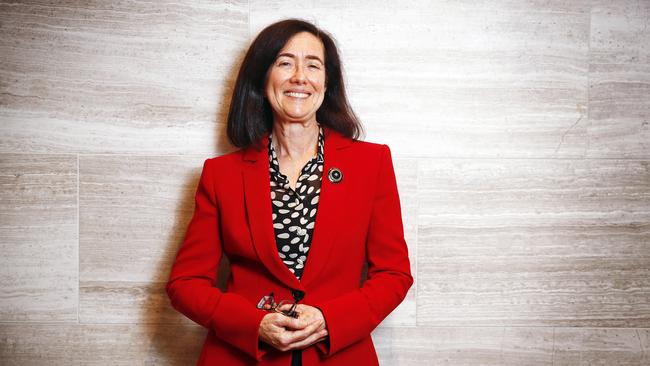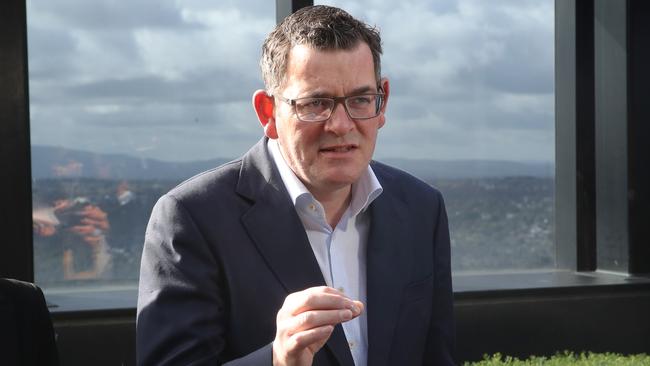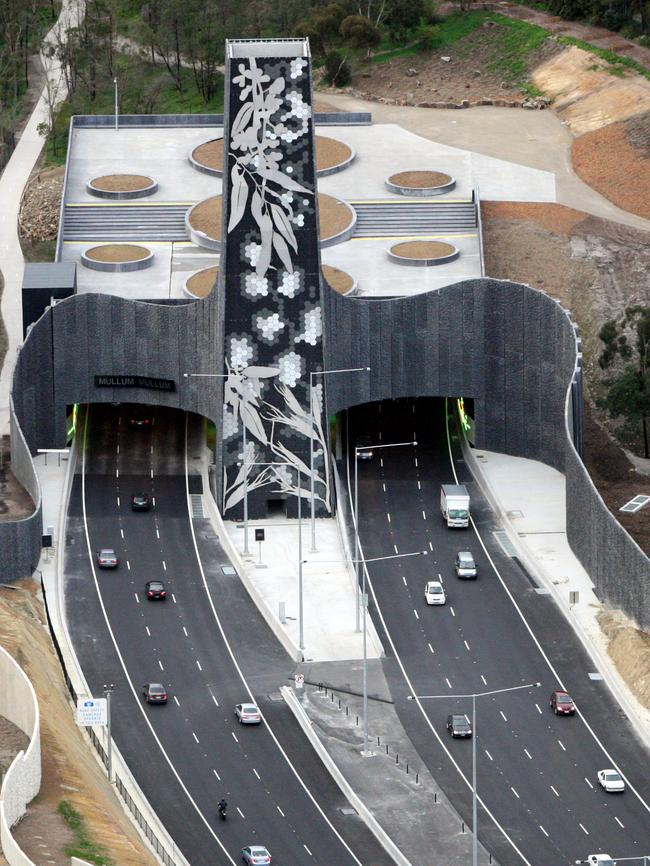Transurban gets a lesson in Victorian premier Dan Andrews’ politics
Victoria had a bigger motivation in urging the regulator to block the toll road operator’s bid for EastLink.
Business
Don't miss out on the headlines from Business. Followed categories will be added to My News.
Transurban owes its creation nearly three decades ago to the well of Victorian politics, but the global toll road operator has just been given a stark reminder about how the state works under premier Dan Andrews.
Australian Competition & Consumer Commission chairman Gina Cass-Gottlieb’s decision to knock back Transurban’s bid to acquire a controlling stake in Melbourne’s EastLink toll road can largely be attributed to the spoiling act from the Andrews’ Victorian government.
The ACCC as an independent federal regulator looked at the proposal on its merits, but Cass-Gottlieb has acknowledged she placed significant weight on Victoria’s concerns, which had opposed the bid,

Cass-Gottlieb said in an interview she had put the brakes on Transurban taking a controlling stake in the 39km road after concluding that any deal would entrench the toll road operator’s position in Victoria and “prevent the entry of a rival operator which could compete closely for future toll road concessions in Victoria”.
Indeed, if the $3bn-plus bid was successful, Transurban would operate every single private-sector controlled toll road in Australia.
Victoria first
By Victoria’s calculations, there was far more downside than upside if the regulator allow Transurban to buy out another road.
From the outset EastLink is a transaction between private shareholders for an established toll road and in more normal times the state government dictates pricing and terms under the concession contract and would work with whoever the operator is.
But the concern from Victoria is that by Transurban gaining even more control of the state’s toll road network, this would scare off potential bidders for the big one: The $11bn North East Link project currently being built by the state government.

This massive project is set to provide the missing link between the Eastern Freeway and the Ring Road connecting the northern and western suburbs, and is expected to be privatised shortly after its completion in 2028. Transurban has publicly confirmed its interest in bidding for the North East Link.
Victoria wants its own process fully contested to maximise the sale price. When the North East Link race is on, it can be certain there won’t be any protest from the state about Transurban participating. In a twist, the two are partners in the $10bn West Gate Tunnel project.
Cass-Gottlieb said the Victorian government’s motivations were a matter for them.
“Our consideration here was both in respect of the present transaction and what would be the impact more broadly on future areas of competition as a result of the present transaction”.
“What we can see is that it would result in Transurban entrenching its position in respect of currently operating all available toll roads and prevent the entry of a rival operator which could compete closely in the future for toll road concessions”.
Tough decisions
From the outset, Transurban looked like it was always going to be in a tough bidding position. It owns the CityLink contract and is the operator of the adjacent West Gate Tunnel project under construction.
But concession agreements mean Transurban has no pricing power beyond its contracts. In addition, in Victoria traffic data is made public, so this too limits any additional advantage Transurban has bidding for future projects.
The decision of the ACCC now raises questions about Transurban hitting the limits of growth in Australia and being able to participate in any future toll road deals. Cass-Gottlieb said any new bid for other roads by Transurban will be assessed on its merits.
Incoming Transurban boss Michelle Jablko now needs to weigh up how to proceed.
She can walk away from the EastLink bid entirely to save Transurban’s firepower for North EastLink, or push ahead with a bid ahead and test the ACCC’s likely injunction in the Federal Court. This would also be a statement from Transurban to challenge the precedent the decision creates.

In a statement, Transurban said it was closely reviewing the decision and will consider all the options available to it.
Transurban also pointed out that the ACCC’s decision is the result of an informal merger clearance process and “not a conclusive finding of law”. Indeed, the finding was under the Section 50 test on whether the acquisition would likely have the effect of “substantially lessening competition in any market”.
EastLink connects the industrial southeast to the city’s freeway network. The toll road also connects to the Monash Freeway, the main feeder route to CityLink. By combining the two it would offer scale, revenue diversification across the city, also offer savings for Transurban on tolling tag and technology.
Transurban is confident in its legal arguments – particularly given the ACCC’s approval for its acquisition of WestConnex two years ago. But this avenue of testing the acquisition in court introduces significant risk to the sellers of the EastLink stake. They will need to weigh up their own options, including the risk the sale would fall through.
Cass-Gottlieb said the circumstances have changed since the WestConnex bid, including that the EastLink stake was the last private toll road not already owned by Transurban. She also drew a distinction between the risk on a bid for a new, untested road (WestConnex) and the mature EastLink asset.
Currently, Spanish infrastructure play Abertis, Queensland’s QIC and industry fund investor IFM are thought to be in the mix for the EastLink stake, although the ACCC’s decision means for the super fund owners serious pricing tension has now evaporated.
johnstone@theaustralian.com.au
More Coverage
Originally published as Transurban gets a lesson in Victorian premier Dan Andrews’ politics





